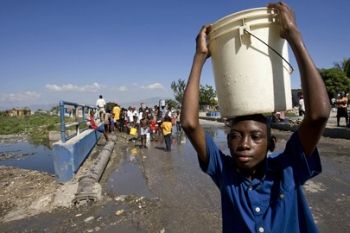
Publisher:
Bonnie King
CONTACT:
Newsroom@Salem-news.com
Advertising:
Adsales@Salem-news.com

~Truth~
~Justice~
~Peace~
TJP
Apr-05-2010 18:05

 TweetFollow @OregonNews
TweetFollow @OregonNews
Empowering Haiti
Stephen Atma Salem-News.comHow to begin to Empower Haiti and start the mending process?
 UN Photo |
(PORTLAND, Ore.) - Looking through the historical lens of Haiti, before the earthquake, before the hurricane, there is a place known to most of the outside world as a Caribbean island and its related connotation.
If you take one step inside Haiti, there is a much different picture; that of poverty, unemployment, sacrifice and sadness. Prior to the recent natural disaster, according to USAID, the current economic situation in Haiti was on slight incline in 2006 but not sufficient enough to start chipping away at nearly 70%-80% unemployment rate as the economic conditions went down in 2008.
Further indications are that the illiteracy rate in Haiti is estimated to be 44%, and about 46% do not have access to portable water. http://www.usaid.gov/locations/latin_america_caribbean/country/haiti/ These numbers are just a small fraction of the unfavorable position in Haiti. So how do we help the Haitian’s build a reversal affect?
The devastation from hurricanes and earthquakes has compounded a very difficult world for the millions that call Haiti home. The infrastructure in Haiti can now be seen from a global perspective that there is much work to be done that can, and will enable a sustainable place to live. The Haitian people know how to survive, but this is not about survival, it about rebuilding their lives so that they have a chance to realize some lost or unreachable dreams.
The earthquake in January 2010 proved difficult, and destroyed what little infrastructure was present. With the global community stepping up to provide aid, it is more than providing food, medical water, it is about empowering the Haitian’s to reach into their own hearts and minds to rebuild a better life for themselves.
The question that should be on everyone’s minds, does the global aid community know how to release that control, or do they have to politicize the process to the point where not even aid gets through. Many Haitian’s realize that the rebuilding process will be a long commitment and effort, in some regard so does the global community; however, are all aid organizations ready to partner and stay the course for the 10 years it will require to rebuild Haiti?
The Haitian people are resilient and will find a way to move forward, but now is the opportune time to provide some tools to enable those devastated by the earthquake the resources to be a part of the solution. On a grander scale this needs to happen, on a smaller scale it is happening; certain organizations on-ground are empowering the people of Haiti to navigate and start down the road to recovery.
Locals are receiving small cash donations from certain groups to buy food and materials that enable preparing meals and enabling small but profitable commerce capability. One such story is that of Françoise Luc who started a business in a refugee camp “crocheting and selling skirts, hats and belts”.[1]
The point being made here is that even though the Haitian people have been continually knocked down, the aid groups need to emphasize more on empowerment to create opportunity and sustainability. This is a story about realizing potential in the face of adversity and capitalizing on one’s innate ability to not just survive, but to grow….
How to begin to Empower Haiti and start the mending process?
Realization and need to get the community more involved in the rebuilding efforts, through community action plans. Build and distribute interim teams of Haitian’s to oversee small devastated areas and have them be the liaison with state government and aid organizations. Most importantly, have an aid distribution oversight committee made up of global, state and local candidates to ensure the best use of aid flowing into Haiti.
[1] news.bbc.co.uk/2/hi/americas/8594830.stm
==================================================
 Stephen Atma is one of those writers who mixes good business sense and technical savvy with his creative side. The result is a level approach to world problems, and Stephen takes a hands on approach. Along with his wife, our African Affairs Correspondent Alysha Atma, Stephen is the kind of person who raises thousands of dollars worth of donations for disaster survivors, and then takes the material there himself to ensure that it goes where it is supposed to go.
Stephen Atma is one of those writers who mixes good business sense and technical savvy with his creative side. The result is a level approach to world problems, and Stephen takes a hands on approach. Along with his wife, our African Affairs Correspondent Alysha Atma, Stephen is the kind of person who raises thousands of dollars worth of donations for disaster survivors, and then takes the material there himself to ensure that it goes where it is supposed to go.
Stephen holds an MBA from Marylhurst University where the emphasis brings business concepts in line with cultural awareness. He says through this combination, there is a greater understanding of the importance of cross cultural involvement in business. There are many areas of the global business world that are intriguing, and Stephen sees an expansive world of business opportunities continuing to emerge. You can write to Stephen Atma at: sjatma@comcast.net
Articles for April 4, 2010 | Articles for April 5, 2010 | Articles for April 6, 2010


Salem-News.com:
googlec507860f6901db00.html
Quick Links
DINING
Willamette UniversityGoudy Commons Cafe
Dine on the Queen
Willamette Queen Sternwheeler
MUST SEE SALEM
Oregon Capitol ToursCapitol History Gateway
Willamette River Ride
Willamette Queen Sternwheeler
Historic Home Tours:
Deepwood Museum
The Bush House
Gaiety Hollow Garden
AUCTIONS - APPRAISALS
Auction Masters & AppraisalsCONSTRUCTION SERVICES
Roofing and ContractingSheridan, Ore.
ONLINE SHOPPING
Special Occasion DressesAdvertise with Salem-News
Contact:AdSales@Salem-News.com

Terms of Service | Privacy Policy
All comments and messages are approved by people and self promotional links or unacceptable comments are denied.
[Return to Top]
©2026 Salem-News.com. All opinions expressed in this article are those of the author and do not necessarily reflect those of Salem-News.com.